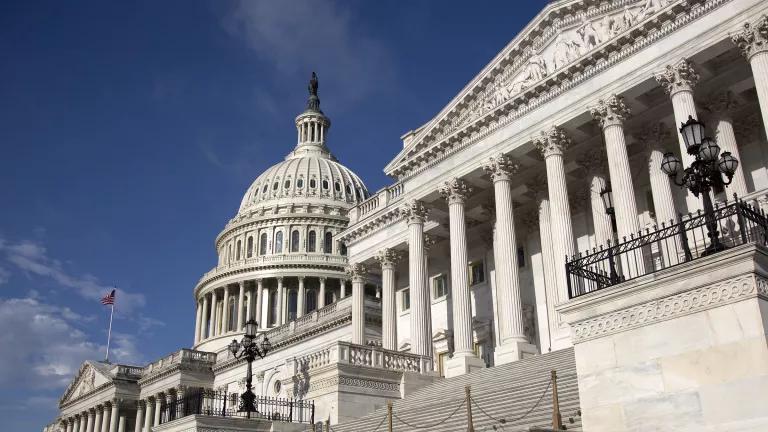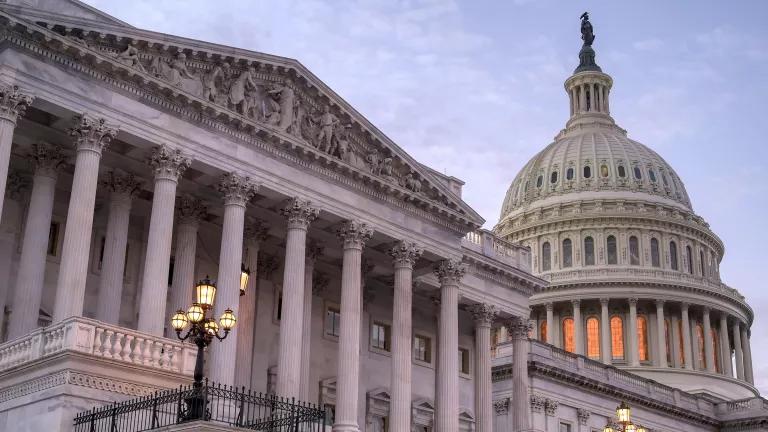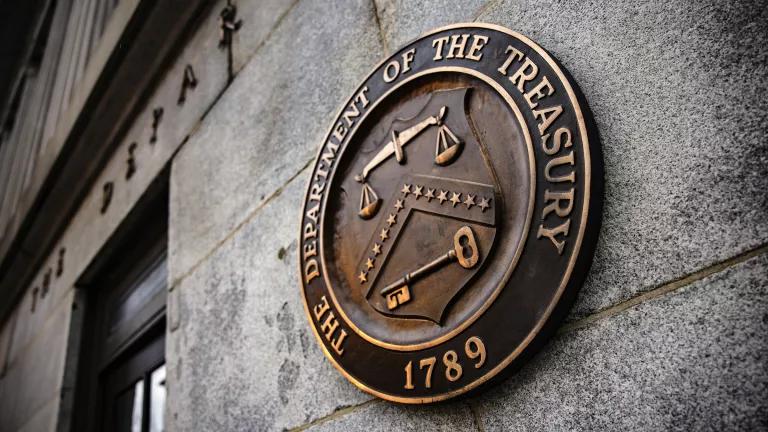The Climate Crisis Is a Reproductive Justice Issue
Just as climate change is having a heavier impact on women of color, ending protections of reproductive rights will also have greater impact on women of color.
On Tuesday, Chief Justice John Roberts confirmed that a draft opinion written by Justice Samuel Alito, which argued for overturning Roe v. Wade and was leaked to Politico.com during the evening of May 2, was, in fact, real.
NRDC stands with organizations such as In Our Own Voice, National Asian Pacific American Women’s Forum, National Birth Equity Collaborative, National Latina Institute for Reproductive Justice, Sister Song, and many others to defend the reproductive rights of all women and people who give birth to access safe reproductive health care.
If the court does overrule Roe v. Wade, such a move would end any federal constitutional right to safe and legal access to abortion in the United States, allowing states to choose for themselves whether to ban the procedure. Twelve states already have “trigger” laws that would automatically make abortion a criminal offense. Many other states have already moved to restrict abortion, using legal loopholes to make it effectively impossible to deliver or receive reproductive care, such as banning an abortion after 15 weeks (Texas and Oklahoma passed restrictions starting at six weeks), before many women are even aware they are pregnant. As a result, abortions could soon be illegal or next to impossible to access in as many as 31 states, with a combined population of more than 135 million people.
From reproductive rights to reproductive justice
Access to abortion is not simply about the right to decide when to have a child or to have access to health care for people who become pregnant. It is also an economic, racial, and environmental justice issue.
The human right to control your body, the right to live in environments that enable people to live healthy lives and, should they choose, the right to have (or choose not to have) and care for children is central to the mission and interest of the entire environmental community.
These principles make up the core of the reproductive justice movement. This movement grew out of Black women’s frustrations with the limits of reproductive rights frameworks that failed to capture the complex social, political, and economic dynamics that they and many other women of color experience. Gathering in 1994 in the wake of the International Conference on Population and Development (ICPD) in Cairo, Black women declared that reproductive justice takes our discussion further than reproductive rights, which is too often limited to contraception, abortion access, and the idea of being “pro-choice.” A justice framework addresses the ways that race, sexual orientation, citizenship status, and religion are targeted systematically to limit women’s—and birthing people’s—ability to act on and fulfill their rights of choice. Factors related to income, housing access, and the criminal justice system also act to restrict the choices that many women of color and low-income people have, impacting not only their access to abortion services when needed, but a full range of reproductive health care, such as pre- and postnatal care, which are often neglected in reproductive rights discussions.
“Twelve states already have “trigger” laws that would automatically make abortion a criminal offense….As a result, abortions could soon be illegal or next to impossible to access in as many as 31 states, with a combined population of more than 135 million people.”
Limiting access to reproductive health services disproportionately impacts Black, Latino, and low-income communities across America. Those inequalities lead to negative effects in many other areas, perpetuating gender and racial inequities.
People don’t just see overall health outcomes improve when their rights to their own bodies are respected. They also see higher incomes and career earnings, advance further in education, and are less likely to feel trapped in abusive relationships.
Women’s freedom to choose and act on their full range of human rights to health is a critical foundation to a more just and sustainable world—and now the climate crisis is increasing the risks to living those freedoms.
The climate crisis is a reproductive justice issue
The negative health and economic effects likely to be caused by striking down abortion rights and limiting access to reproductive care will be greatly exacerbated by climate change.
Each year brings more evidence of climate change–related environmental disasters reshaping economies and social structures and fundamentally altering life on the planet. The question is no longer “why” or “if” climate change is happening but how communities around the world are affected and how we will respond collectively in order to safeguard human health, safety, and freedom.
“Limiting access to reproductive health services disproportionately impacts Black, brown, and low-income communities across America. Those inequalities lead to negative effects in many other areas, perpetuating gender and racial inequities.”
Thanks to the efforts of many environmental justice leaders and advocates, we know how racism shapes patterns of environmental burdens, climate risk, and the politics of addressing it. However, the way climate change impacts are experienced is also significantly determined by gender. Still, gendered analysis of the causes and risks from the impacts of climate change are far less appreciated, particularly in the United States, where climate-induced natural disasters are displacing women from their homes at disproportionate rates.
The climate justice movement (particularly in the United States) must do more to integrate a gender-specific lens into our climate advocacy and research. Internationally, this work is already well advanced with gender analysis being mainstreamed into assessments of Nationally Determined Contributions (NDCs), submitted to the United Nations annually. The United Nations Development Programme (UNDP) offers guidance for government stakeholders and advocates to help develop steps that ensure national climate action supports gender equity.
Similarly, the Sustainable Development Goals (SDGs) include Goal 5 on gender equality and empowering all women and girls, and see it tied explicitly to Goal 13 on climate action.
All of this work has led to a deeper understanding of the connections between climate change and women’s reproductive justice at the international level, with a focus on developing countries. However, far less is understood about how these dynamics intersect in the United States.
Research has begun to uncover the cumulative impact climate change has as a stressor on reproductive health, increasing already heightened burdens on women of color. The combined effects of rising temperature averages, air pollution, and the increasing risk of displacement and disruption due to extreme weather, combined with already inadequate (and worsening in many states) access to reproductive health services, contributes to higher rates of maternal and infant mortality among women of color, and Black women particularly.
Yet most climate action plans and emergency weather services fail to address gender as a specific category of risk. Without the research based in a reproductive justice framework to better understand and respond to the inequitable effects that climate change has on women and birthing persons, there isn’t any pressure to change public policies or strategies to address the gendered dynamics of climate change.
“All of this work has led to a deeper understanding of the connections between climate change and women’s reproductive justice at the international level and with a focus on developing countries. However, far less is understood about how these dynamics intersect in the United States.”
Any decision by the Supreme Court eliminating abortion rights would exacerbate the increased risk women face due to climate change, and place women’s rights and justice further outside the legal frameworks that should protect them and strengthen advocacy.
Your struggle is my struggle
Reproductive justice must stand at the forefront of action to address the global climate crisis. Women of color are simultaneously the most adversely impacted by climate change and environmental injustice, even as they have been our most vocal leaders for just and effective solutions through environmental justice organizations across this nation.
Just as we’ve stood up to call out racism and pledge to stand for racial justice, we now must call out the misogyny and misogynoir behind attacks on Roe v. Wade and stand with our allies for gender justice before any decision to overrule it becomes final.
“...ending legal protections for reproductive rights will, like climate change, have disproportionate effects on Black and Latina women. They are more likely to work in the low-wage service economy with few (if any) health benefits and no paid family leave time to take care of young children, all of which heightens the risk of postpartum depression.”
As the conservative movement drags the nation into backsliding on reproductive justice, other nations are continuing to move forward and ahead of us.
That the Supreme Court is even considering overruling Roe v. Wade is another in a growing list of actions taking us backward in time. From book bans against critical race theory and LGBTQ content to political attacks against transgender youth, we see a worrying trend toward reliance on backlash politics: a political movement where one side is more interested in enacting policies to hurt the people they hate and fear than addressing any number of issues, such as rising poverty, inequality, and the climate crisis.
Reproductive justice crosses all those issues, and it is why we must stand with women around the country who are rising up to defend their own bodies from political aggression. And yet, as crosscutting as the issue of reproductive justice is, we know that ending legal protections for reproductive rights will, like climate change, have disproportionate effects on Black and Latina women. They are more likely to work in the low-wage service economy with few (if any) health benefits and no paid family leave time to take care of young children, all of which heightens the risk of postpartum depression, a condition that is misdiagnosed and severely under-reported among women of color. These same women are also more likely to work in sectors that expose them to hazardous chemicals and other toxic substances.
The leak of Justice Alito’s draft opinion surprised everyone, even as the contents of that opinion did not.
And after hearing the outpouring of response from women and activist across this nation, there are three other things we should also know:
First, there can be no climate justice without reproductive justice.
Second, the women’s movement—and women of color specifically—need allies.
And third, we must never go back!

Alex Brandon/Associated Press




